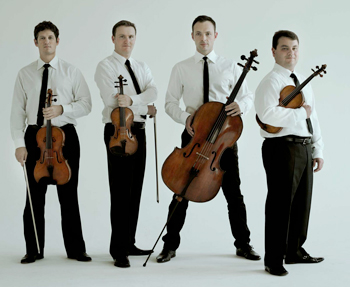by Mike Telin

On Tuesday, February 24 at 7:30 pm at Plymouth Church, the Jerusalem Quartet, made up of Alexander Pavlovsky and Sergei Bresler, violins, Ori Kam, viola, and Kyril Zlotnikov, cello, will return to the area for a concert for the Cleveland Chamber Music Society, their third appearance on the series since 2010. The program features Mozart’s Quartet in G, K. 387, Schulhoff’s Five Pieces and Schumann’s Quartet No. 3 in A, op. 41, no. 3. David Rothenberg will give a pre-concert lecture beginning at 6:30 pm.
The quartet, which is currently in the middle of a North American tour, was unable to speak with us by telephone. However, Alexander Pavlovsky graciously agreed to answer questions by e-mail.
Mike Telin: I like your program very much. Can you say a few words about it?
Alexander Pavlovsky: I think this program has a nice combination of three different styles: the classical, 20th century and the romantic. The Mozart quartet is a miracle of musical creation, imagination, taste, part-writing and proportion. It works great together with the beautiful Schumann quartet, which probably has the most amazing slow movement in all the romantic repertoire. And the Schulhoff 5 Pieces as the middle work makes this program well balanced.
MT: I’ve enjoyed the music of Schulhoff for many years and I am happy to see that it is now being programmed more frequently than in the past. Why do you think it has taken so long for people to discover his music?
AP: There is a big and very interesting group of European Jewish composers whose life and musical careers were stopped by the Nazi regime. I am talking about Schulhoff, Zemlinsky, Krasa, Pavel Haas and many others. In their short lives they created fantastic compositions including many quartet works. We are happy to present Schulhoff’s 5 Pieces on this program. This very interesting opus presents five short and different miniatures. It’s like a little musical trip around the globe.
MT: How do you choose your programs? Is it a group decision?
AP: The string quartet repertoire is amazing and endless. One life is too short to explore it all. From the beginning we have tried to cover as much as we can, from the very first opuses of “Papa” Haydn to the modern music of the 20th and 21st centuries, including opuses written especially for us. Our feeling is that the public also finds this variety, as in our Cleveland program, successful and entertaining. We always try to offer our audience this kind of variety. Unless we make a special project, like a cycle of Brahms, Shostakovich, or Bartók, or focus only on music of the 20th century, for example. And of course it is a group decision.
MT: The Quartet has made many wonderful recordings: how do you think recordings advance the career of an artist or ensemble?
AP: First of all, we are very lucky to have such a long relationship with the Harmonia Mundi label. At a time when the recording business is so weak and problematic, we have an opportunity to record an album or two every year. Second, the recording process is also a very special experience. We learn a lot from every recording session and have long-term ideas for the future.
MT: Pursuing a career in chamber music is a risk: why did you decide to take that risk?
AP: Well, in our special case when we started to play together in high school about the age of 16, there was no place for risk. We were chosen by school direction and our first teacher, Avi Abramovich, who gave us such a wonderful base. We did not think a lot about the future. We were concentrating on building a repertoire and enjoying every moment of being part of such an amazing ensemble. Our goal was to find the right balance between sounding like one 16-stringed instrument while preserving the individuality and personality of each member.
MT: What advice do you give to young musicians who say that they want to pursue a career in chamber music?
AP: Start playing chamber music as early as possible. It gives an additional perspective on the performing process and helps and enriches everyone, whether orchestra player or soloist. The most important thing is to learn how to listen to each other and react.
Published on ClevelandClassical.com February 17, 2015.
Click here for a printable copy of this article


